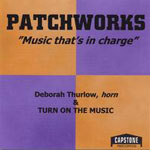Home » Jazz Articles » Album Review » Deborah Thurlow: Patchworks
Deborah Thurlow: Patchworks
Each piece has a different compositional esthetic or methodology which can include more or less improvisational freedom for the performers, and also different amounts of "synthetic sounds. While the notes are helpful in getting a better idea of what is going on and why, they are actually not needed to enjoy the music. If music is organized sound in time, then this is music, although it stretches the boundaries quite a bit. There are discrete pitches, and even some tonality in the form of a root note, if not a key. Development happens most often through changes in texture, and there is very little feeling of a pulse. Themes or motives, if they appear at all, are most often played by Thurlow on processed horn. Sonic allusions are also mostly nonexistent, except for the theremin, which seems to be linked (at least to me) to science fiction, and the sound of "Mellow Evening, which is distinctly Indian.
The effort, therefore, for the listener is to let the music happen and listen as the overall effect of the proceedings changes. Withholding preconceptions might be the most difficult thing, but once done, the music is quite moving and engrossing. Sound as sound, regardless of how it is produced (that is, from a "pure instrument, a processed instrument, or a computer), becomes the organizing principle, and experiencing how different sounds with varying degrees of familiarity interact to produce an aural atmosphere that shimmers, expands, and almost changes color while it envelopes you becomes an end in itself. To be sure, this is different emotional and intellectual territory than most jazz, or even most music for that matter, but the live audiences present for these performances applauded appreciatively.
There is one piece that can be described a bit more deeply, and that is "Mellow Evening by Kali Fasteau. Built from a raga that exists in both northern and southern India, it is traditionally beautiful, and very much evokes the feeling of calm serenity that Fasteau mentions in the liner notes. The music has much more of a feeling of being played by a "band, in that there is less electronics and no computer present as Fasteau demonstrates her ability to directly link her spirit with her playing. It creates a delightful and soothing ending to the disc.
Thurlow is clearly a master of this area of musical composition and performance, attracting talented composers and performers into the orbit of Turn on the Music.
Track Listing
Scramble; X; Overture (Op. 47); Woods; Quartet (Op. 51); Emerging; Mellow Evening.
Personnel
Deborah Thurlow: horn, vocal, composer; George Kitzis: violin; Clive Smith: electric guitar, composer; Bob Kaus: electric bass, electric 12-string guitar; Kali Z. Fasteau: sporano sax, ney flute, vocal; Eric Ross: theremin, piano, composer; Scott Robinson: theremin; Bruce McKinney: composer
Album information
Title: Patchworks | Year Released: 2005 | Record Label: Capstone Records
< Previous
Xieyi
Next >
Three Point Landing
Comments
Tags
For the Love of Jazz
 All About Jazz has been a pillar of jazz since 1995, championing it as an art form and, more importantly, supporting the musicians who create it. Our enduring commitment has made "AAJ" one of the most culturally important websites of its kind, read by hundreds of thousands of fans, musicians and industry figures every month.
All About Jazz has been a pillar of jazz since 1995, championing it as an art form and, more importantly, supporting the musicians who create it. Our enduring commitment has made "AAJ" one of the most culturally important websites of its kind, read by hundreds of thousands of fans, musicians and industry figures every month.



















